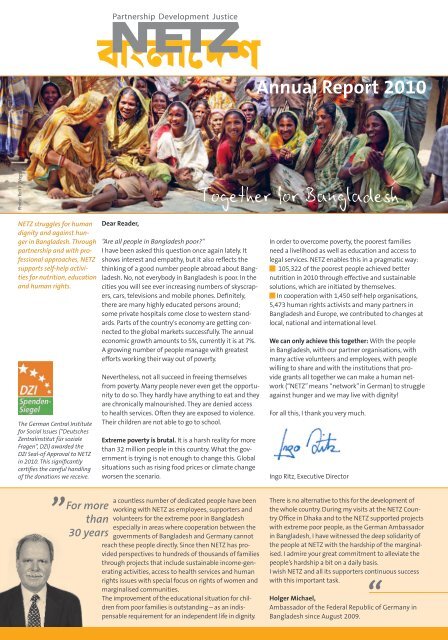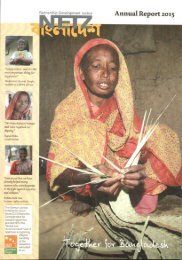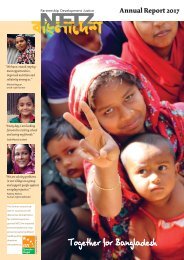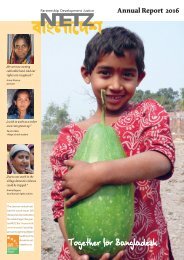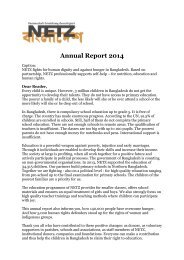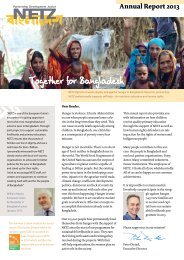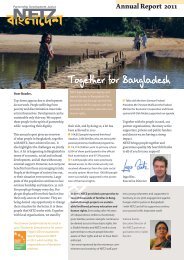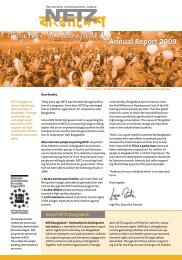NETZ Bangladesch Annual Report 2010
Create successful ePaper yourself
Turn your PDF publications into a flip-book with our unique Google optimized e-Paper software.
<strong>Annual</strong> <strong>Report</strong> <strong>2010</strong><br />
Photo: Rolf K. Wegst<br />
Together for Bangladesh<br />
<strong>NETZ</strong> struggles for human<br />
dignity and against hunger<br />
in Bangladesh. Through<br />
partnership and with professional<br />
approaches, <strong>NETZ</strong><br />
supports self-help activities<br />
for nutrition, education<br />
and human rights.<br />
The German Central Institute<br />
for Social Issues (“Deutsches<br />
Zentralinstitut für soziale<br />
Fragen”, DZI) awarded the<br />
DZI Seal-of Approval to <strong>NETZ</strong><br />
in <strong>2010</strong>. This significantly<br />
certifies the careful handling<br />
of the donations we receive.<br />
Dear Reader,<br />
“Are all people in Bangladesh poor?“<br />
I have been asked this question once again lately. It<br />
shows interest and empathy, but it also reflects the<br />
thinking of a good number people abroad about Bangladesh.<br />
No, not everybody in Bangladesh is poor. In the<br />
cities you will see ever increasing numbers of skyscrapers,<br />
cars, televisions and mobile phones. Definitely,<br />
there are many highly educated persons around;<br />
some private hospitals come close to western standards.<br />
Parts of the country‘s economy are getting connected<br />
to the global markets successfully. The annual<br />
economic growth amounts to 5%, currently it is at 7%.<br />
A growing number of people manage with greatest<br />
efforts working their way out of poverty.<br />
Nevertheless, not all succeed in freeing themselves<br />
from poverty. Many people never even get the opportunity<br />
to do so. They hardly have anything to eat and they<br />
are chronically malnourished. They are denied access<br />
to health services. Often they are exposed to violence.<br />
Their children are not able to go to school.<br />
Extreme poverty is brutal. It is a harsh reality for more<br />
than 32 million people in this country. What the government<br />
is trying is not enough to change this. Global<br />
situations such as rising food prices or climate change<br />
worsen the scenario.<br />
In order to overcome poverty, the poorest families<br />
need a livelihood as well as education and access to<br />
legal services. <strong>NETZ</strong> enables this in a pragmatic way:<br />
105,322 of the poorest people achieved better<br />
nutrition in <strong>2010</strong> through effective and sustainable<br />
solutions, which are initiated by themselves.<br />
In cooperation with 1,450 self-help organisations,<br />
5,473 human rights activists and many partners in<br />
Bangladesh and Europe, we contributed to changes at<br />
local, national and international level.<br />
We can only achieve this together: With the people<br />
in Bangladesh, with our partner organisations, with<br />
many active volunteers and employees, with people<br />
willing to share and with the institutions that provide<br />
grants all together we can make a human network<br />
(“<strong>NETZ</strong>” means “network” in German) to struggle<br />
against hunger and we may live with dignity!<br />
For all this, I thank you very much.<br />
Ingo Ritz, Executive Director<br />
For more<br />
than<br />
30 years<br />
Together for Bangladesh<br />
a countless number of dedicated people have been<br />
working with <strong>NETZ</strong> as employees, supporters and<br />
volunteers for the extreme poor in Bangladesh<br />
especially in areas where cooperation between the<br />
governments of Bangladesh and Germany cannot<br />
reach these people directly. Since then <strong>NETZ</strong> has provided<br />
perspectives to hundreds of thousands of families<br />
through projects that include sustainable income-generating<br />
activities, access to health services and human<br />
rights issues with special focus on rights of women and<br />
marginalised communities.<br />
The improvement of the educational situation for children<br />
from poor families is outstanding – as an indispensable<br />
requirement for an independent life in dignity.<br />
There is no alternative to this for the development of<br />
the whole country. During my visits at the <strong>NETZ</strong> Country<br />
Office in Dhaka and to the <strong>NETZ</strong> supported projects<br />
with extreme poor people, as the German Ambassador<br />
in Bangladesh, I have witnessed the deep solidarity of<br />
the people at <strong>NETZ</strong> with the hardship of the marginalised.<br />
I admire your great commitment to alleviate the<br />
people’s hardship a bit on a daily basis.<br />
I wish <strong>NETZ</strong> and all its supporters continuous success<br />
with this important task.<br />
Holger Michael,<br />
Ambassador of the Federal Republic of Germany in<br />
Bangladesh since August 2009.<br />
1
32 million people in Bangladesh suffer<br />
from hunger. People supporting and<br />
working with <strong>NETZ</strong> do not take it as an<br />
unchangeable destiny. Together with<br />
Programme 1: Sustainable livelihood<br />
<strong>NETZ</strong> struggles against hunger<br />
partner organisations and women from<br />
affected families, <strong>NETZ</strong> has developed a<br />
concept for self-help. It enables the poorest<br />
families to sustainably free themselves<br />
from this misery.<br />
<strong>NETZ</strong> supported 28,782 families through the livelihood programme<br />
enabling them to generate a sustainable income for<br />
them and by themselves. Now they are able to provide food,<br />
clothing, healthcare and education for their children.<br />
<strong>NETZ</strong> included additional 10,972 families in the programme<br />
in <strong>2010</strong>.<br />
Jhaina Begum: An Example:<br />
Hunger almost doomed her life. For eight months a year Jhaina<br />
Begum could not provide sufficient food to her children. Her<br />
husband Ramiz, a worker in the agricultural field, could not<br />
earn enough to support his family of five. The couple had no<br />
possessions. On average, the family had 15 Euro cents on their<br />
disposal per day. Through the initiative of the livelihood programme,<br />
Jhaina Begum formed a group with other women<br />
from her village. She participated in training sessions and she<br />
was given a cow. After six months, she was able to generate her<br />
first profit. With that she took lease of a piece of land. Within<br />
three years, the family, living on a river island in the Teesta river<br />
in the district of Rangpur, tripled its income.<br />
Helping<br />
where the<br />
need is<br />
greatest!<br />
This is what we decided for at the High<br />
School at St. Michael in Schwaebisch Hall<br />
and made a donation to the livelihood programme<br />
of <strong>NETZ</strong>. The <strong>NETZ</strong> approach of providing<br />
sustainable support to the poorest<br />
with the goal of enabling self-help has led us<br />
to this decision. With the collective effort of 1,300 students, we<br />
succeeded to generate a handsome amount of money at our<br />
Christmas bazar to give 85 of the poorest families in Bangladesh<br />
the opportunity of a better future – without hunger! We<br />
are very proud that we jointly achieved so much, thus making a<br />
small contribution to a fairer world!<br />
Members of the student‘s<br />
council at the High School<br />
at St. Michael in Schwaebisch<br />
Hall (left to right):<br />
Tabea Kirschbaum, Mario<br />
Baumann and Nina Balta.<br />
Overview of the livelihood<br />
programme<br />
Development of self-help for the<br />
poorest.<br />
Training courses in agriculture,<br />
management of a small business,<br />
women‘s rights, healthcare and<br />
disaster preparedness.<br />
Assets were given: cows, goats,<br />
chicken, a rickshaw, equipment for a<br />
small business or seeds and the rent<br />
for a piece of land for cultivating rice<br />
and vegetables.<br />
28,782 families sustainably generate<br />
their own income.<br />
The women have become focal<br />
persons of development and claim<br />
their rights.<br />
Livelihood programme: Challenges<br />
Now she is able to support her family:<br />
Jhaina Begum on her leased piece of land.<br />
Who has received support?<br />
28,782 mothers of the poorest<br />
families organised themselves in<br />
1,478 village groups.<br />
13,534 women participated in<br />
training sessions.<br />
10,972 families were newly<br />
included in the programme and<br />
received assets.<br />
This income results in improved<br />
nutrition for 105,322 family<br />
members.<br />
With the support of the village<br />
groups, e.g. 5,650 families receive<br />
support from official social safety<br />
net programmes.<br />
<strong>NETZ</strong> works together with the poorest families. The livelihood programme<br />
also includes women who are not fully able to work due<br />
to their age or a physical handicap. Until now they mainly made<br />
their living through begging. Especially for them it is difficult to<br />
sustainably generate income on their own. This is the initial situation<br />
for 15% of the families in the programme. An objective<br />
of <strong>NETZ</strong> is to sustainably improve the living conditions of these<br />
households. To overcome this, they now receive a more intensive<br />
support and training within the programme.<br />
At the same time, the solidarity of the village groups for the less<br />
successful neighbours is increasing. They support the particularly<br />
disadvantaged in their agricultural work. At the same time the village<br />
groups advocate for the people with special needs and female<br />
headed households so that they might receive the support from<br />
the official social safety net programmes which they are entitled<br />
to.<br />
Photo: Peter Dietzel<br />
2 <strong>NETZ</strong> <strong>Annual</strong> <strong>Report</strong> <strong>2010</strong>
More than<br />
100,000 people<br />
in Bangladesh<br />
were able to overcome hunger with the<br />
support from Germany through the livelihood<br />
programme of <strong>NETZ</strong>. With the<br />
support of our partner organisations,<br />
women from the poorest families now<br />
design family development plans. They<br />
receive training as small-scale entrepreneurs and an initial<br />
capital, for instance, for cows, goats or seeds and leasing land<br />
for the cultivation of rice, fruits and vegetables. With the sales<br />
profit they can again buy livestock or take lease of new land.<br />
In this way, their standard of living changes fundamentally<br />
and definitely in a sustainable way. However, the programme<br />
changes much more than just enabling people to feed themselves<br />
and their families.<br />
Ossified power structures and conflicting political conditions<br />
as well as economical disadvantages create poverty and preserve<br />
it. If a tragedy occurs, poverty becomes life-threatening.<br />
Only when many affected people combine their efforts,<br />
change will be possible and the struggle against poverty will<br />
succeed sustainably. These changes are often invisible in the<br />
beginning as they progress in small steps. But little by little<br />
they change a society so that the poorest can get justice. That<br />
is why we initiate self help that sustains after the period of<br />
a project. Women organise themselves in the livelihood pro-<br />
gramme of <strong>NETZ</strong> independently and stand up for each other.<br />
‘We can make it too‘ – that is the translated name of the federation<br />
of women‘s groups in Darshana, in the western part of<br />
the country, where we have been cooperating with our partner<br />
Jagorani Chakra Foundation since 2002. Meanwhile, the federation<br />
consists of 5,670 members and more than 65 employees,<br />
who are financed from their own resources. The federation<br />
manages the savings of the members and is responsible<br />
for the awarding of small loans. They also look after 35 preschools,<br />
which were built up and maintained by the women.<br />
Three women already got elected into the local Union Parishad,<br />
i.e. Union Council, and advocate the rights of the poor.<br />
The children of these women<br />
will grow up in a changed situation<br />
as their mothers were<br />
fighting for their survival and<br />
rights.<br />
Manfred Krueger, Chairperson of<br />
<strong>NETZ</strong> Bangladesh; here together with<br />
Anzira Khartun, Chairperson of the<br />
women’s federation in Darshana.<br />
Photo: Peter Dietzel<br />
Programme 2: Primary education<br />
<strong>NETZ</strong> supports the poorest children<br />
In Bangladesh, about four million children<br />
between the age of six and ten are not in a<br />
position to go to school. More than half of all<br />
girls and boys do not complete their primary<br />
education. One can find manifold reasons<br />
why children from poor families do not continue<br />
or do not even enrol at school. Additionally,<br />
the quality of education in many<br />
formal primary schools is so poor that the<br />
children hardly learn anything.<br />
Photo: Lukas Jednicki<br />
<strong>NETZ</strong> was active in 346 primary schools in <strong>2010</strong>: 19,435 students<br />
learned how to read, write and do arithmetic in these<br />
schools. They were given the basic skills for a better future.<br />
Children in remote areas, such as the river islands in the major<br />
rivers in the north of the country and indigenous children, whose<br />
mother tongue is not spoken in primary schools, have less educational<br />
opportunities. <strong>NETZ</strong> ensures their fundamental right to<br />
education through the construction of 270 basic non-formal primary<br />
schools.<br />
Together for Bangladesh<br />
<strong>NETZ</strong> additionally supports 66 formal primary schools already<br />
existing in the project region:<br />
<strong>NETZ</strong> involves education support organisers in formal schools<br />
to reach out to especially disadvantaged children.<br />
<strong>NETZ</strong> strengthens and trains teachers so that they can design<br />
and carry out their lessons more efficiently.<br />
Parents’ and school committees are established and strengthened<br />
to voice a claim for an improvement in the quality of teaching<br />
lessons with the relevant authorities.<br />
3
Right to education: Students of Sufia Kamal<br />
Anandalok Primary School in Gaibandha.<br />
Photo: Lukas Jednicki<br />
New community-run primary schools in Bangladesh<br />
<strong>NETZ</strong> supports 10 new primary schools run by the community<br />
with an improved teaching and learning concept for the<br />
classes 1 to 5. These have been built and equipped with <strong>NETZ</strong><br />
funds since 2008. After the end of the support of <strong>NETZ</strong>, the<br />
schools will continue running their education by the people<br />
from the village. In <strong>2010</strong>, total 1,247 students were enrolled in<br />
these schools where half of them were from the poorest families.<br />
Each year, 300 children are newly admitted. Doctors are visiting<br />
each school twice a year for health check-up. The quality of<br />
the lessons is improved through intensive training and pedagogical<br />
guidance for the teachers and further development of the<br />
learning materials. From 2012 onwards, the construction of new<br />
schools is planned.<br />
Overview of the education projects<br />
in <strong>2010</strong><br />
346 schools provided improved<br />
quality education<br />
Learning materials and two health<br />
camps per year were financed at 270<br />
basic non-formal schools built by<br />
<strong>NETZ</strong><br />
Learning materials and two health<br />
camps per year as well as intensive<br />
training for teachers were financed<br />
for 10 community-run primary<br />
schools built by <strong>NETZ</strong><br />
Improved quality of teaching and<br />
special support for the poorest<br />
children in 66 formal primary schools<br />
35 pre-schools, which are<br />
independently organised by women‘s<br />
self-help institutions<br />
Training of teachers<br />
Who has received support?<br />
19,435 students<br />
7,365 girls and boys<br />
1,247 students<br />
10,823 girls and boys<br />
949 pre-school age children<br />
457 teachers<br />
WeltKlasse!<br />
Partnership with schools in Bangladesh<br />
In <strong>2010</strong>, 101 schools in Bangladesh found a partner<br />
in Germany and Austria: parishes, schools, associations,<br />
enterprises and individuals. The <strong>NETZ</strong> programme<br />
“WeltKlasse!” facilitates this partnership with schools<br />
in Bangladesh. Letters and photographs are exchanged.<br />
Young people doing voluntary services with <strong>NETZ</strong> in<br />
Bangladesh report from these schools – also at events.<br />
Photo: Lisa Szepan<br />
Primary education: Challenges<br />
The quality of teaching has to be further improved, because<br />
especially in remote areas the educational level of the available<br />
teachers is comparatively low. Therefore, the training of teachers<br />
is very important.<br />
Children with special needs are already targeted by the schools<br />
and being supported. However, their integration into the lessons<br />
and raising awareness for their situation, e.g. with the teachers,<br />
remains a challenge.<br />
<strong>NETZ</strong> and its partner organisations are cooperating to further<br />
strengthen political dialogue at local and national level in order<br />
to hold the state accountable.<br />
to the students and teachers every day<br />
during school break. With the sales<br />
profit, we support non-formal schools<br />
in the Northwest of Bangladesh. We are<br />
glad that we found a partner in <strong>NETZ</strong><br />
that transparently and comprehensively<br />
shows how support works. “WeltKlasse!”<br />
is a coherent concept that enables active<br />
exchange with schools in Bangladesh as well as with <strong>NETZ</strong><br />
itself. Personal reports and visits by <strong>NETZ</strong> members enrich<br />
the every-day school life for our adolescents. During their<br />
lessons and in the “one world” working group they are<br />
dealing with global issues and receive<br />
feedback on how they can contribute to<br />
a fairer balance between the North and<br />
South.<br />
Students and<br />
parents sell<br />
home-made<br />
sandwiches<br />
Boris Couchoud, teacher and head<br />
of the “one world” working group at<br />
the Otto Hahn High School in Bergisch<br />
Gladbach.<br />
4 <strong>NETZ</strong> <strong>Annual</strong> <strong>Report</strong> <strong>2010</strong>
The protection of fundamental human rights is an<br />
integral part of the constitution of Bangladesh.<br />
In reality, however, there are large groups of peo-<br />
Programme 3: Human rights<br />
<strong>NETZ</strong> stands up for the rights of the poorest in the villages<br />
Photo: Insa Bloem<br />
ple whose rights are systematically violated. These<br />
include landless people, women and minorities. The<br />
existing laws are not properly enforced and applied.<br />
The legal framework needs improvement in many<br />
aspects as well.<br />
<strong>NETZ</strong> extends its support to leading human rights organisations<br />
in Bangladesh to strengthen these people to become aware of<br />
their rights and to strive for their compliance. At the same time,<br />
<strong>NETZ</strong> is part of a network working towards improving the legal<br />
framework and ensuring legal prosecution whenever rights are<br />
grossly violated.<br />
As members of human rights committees and human rights<br />
theatre groups, 5,473 women and men in 10 districts participated<br />
in training sessions in order to follow-up violations of<br />
human rights in their villages and to assist the victims.<br />
In more than 100 legal camps, 209 women and 123 men, who<br />
otherwise would have had no access to legal advice, received<br />
support; they were supported in applying for funding by the public<br />
legal aid fund.<br />
In 220 mediations conflicts other than criminal offences were<br />
solved outside of courts and in compliance with the law.<br />
Photo: Insa Bloem<br />
Advocating human rights: Human rights activist<br />
Devan Khadiza Mahmud, called Raka, from<br />
Naogaon.<br />
36 victims of violence were treated in hospitals.<br />
In 881 public performances, voluntary theatre groups<br />
informed a total of 580,000 persons about right violations like<br />
domestic violence and child marriages as well as about rights<br />
violations exercised by officials.<br />
Defenders of human rights, who were exposed to repression, are<br />
supported through international solidarity as well as by concrete<br />
medical or legal aid on the spot.<br />
Human rights: Challenges<br />
Traditions and existing power structures in the villages are serious<br />
obstacles for the human rights work by the committees<br />
and theatre groups. Set ways of thought need to be opened<br />
up, even among the activists themselves. Additionally, human<br />
rights work always includes questioning of existing power<br />
structures and claiming change towards equality and justice.<br />
Some of them being afraid of losing their power, obstruct<br />
directly or indirectly the work of the committees. Men bar their<br />
wives from attending the meetings of the committees. Theatre<br />
activists very often receive open threats. This resistance<br />
decreases with rising recognition of the work of the committees<br />
– but still it is very powerful.<br />
Programme 4: Disaster preparedness and response<br />
<strong>NETZ</strong> promotes disaster coping capacity and provides sustainable assistance<br />
Bangladesh is among the countries that are most<br />
affected by the consequences of climate change.<br />
Together for Bangladesh<br />
In all flood-prone working areas, <strong>NETZ</strong> promotes prevention.<br />
People participate in training sessions and build-up a disaster<br />
fund. School buildings are better protected as they are built like<br />
that and the accommodation is above the ground level. In <strong>2010</strong>,<br />
<strong>NETZ</strong> financed technical security checks of four flood shelters in<br />
the coastal area that were constructed by the support of <strong>NETZ</strong><br />
back in 1991-92.<br />
<strong>NETZ</strong> provided blankets and warm clothes to 6,532 families<br />
who suffered from the severe cold in the Northwest of Bangladesh<br />
in January <strong>2010</strong>.<br />
5
<strong>NETZ</strong> brought together civil society organisations<br />
and human rights defenders from<br />
Bangladesh with political stakeholders<br />
from German and other European countries<br />
in <strong>2010</strong>. In this way, the recommendations<br />
from the civil society on human<br />
Strengthening rights and combating poverty<br />
through political dialogue and networking – for better policies<br />
rights and development issues were<br />
brought into the political dialogue and the<br />
related work in Bangladesh was strengthened.<br />
Standing up for women’s rights: A rally of human rights<br />
defenders in Dhaka.<br />
Photo: Lukas Jednicki<br />
For this purpose, <strong>NETZ</strong> works together with Amnesty International,<br />
Bread for the World, Church Development Service, Misereor,<br />
Shanti and many other organisations. The name of this network<br />
is Bangladesh Forum Germany where <strong>NETZ</strong> has been taking<br />
the coordination lead.<br />
between grass-roots activists from Bangladesh and representatives<br />
from the international community led to a better understanding<br />
of the needs of the extreme poor and marginalised<br />
groups in Bangladesh.<br />
In <strong>2010</strong>, the Bangladesh Forum Germany conducted conferences<br />
in Berlin and Brussels with human rights defenders as well<br />
as development experts from Bangladesh on “‘Inclusive Citizenship’<br />
for Good Governance in Bangladesh”. Representatives of EU<br />
institutions, the German Federal Foreign Office, the German Federal<br />
Ministry for Economic Cooperation and Development and<br />
the governmental development cooperation as well as members<br />
of the German Parliament and Government officials from Bangladesh<br />
participated in these conferences. Furthermore, numerous<br />
European NGOs and research institutions working on Bangladesh<br />
participated in these conferences. This direct exchange<br />
Exchanging views on<br />
the situation in Bangladesh:<br />
Dipu Moni,<br />
Foreign Minister of<br />
the People’s Republic<br />
of Bangladesh, and<br />
<strong>NETZ</strong> staff member<br />
Dirk Saam in September<br />
<strong>2010</strong> in Berlin.<br />
Photo: Mosud Mannan<br />
<strong>NETZ</strong>-Partners and projects in Bangladesh<br />
Gana Unnayan Kendra<br />
(GUK)<br />
Sustainable livelihood<br />
Primary education<br />
Disaster preparedness<br />
Polli Sree<br />
Sustainable livelihood<br />
Ashrai<br />
Sustainable livelihood<br />
Primary education<br />
Sachetan<br />
Sustainable livelihood<br />
Jagorani Chakra<br />
Foundation (JCF)<br />
Sustainable livelihood<br />
Primary education<br />
.<br />
Rajshahi<br />
. Rangpur<br />
.<br />
Khulna<br />
.<br />
Barisal<br />
Mahideb Jubo Somaj<br />
Kallayan Somity<br />
(MJSKS)<br />
Sustainable livelihood<br />
.<br />
Dhaka<br />
.<br />
Sylhet<br />
.<br />
Chittagong<br />
Udayan Swabolombee<br />
Sangstha (USS)<br />
Sustainable livelihood<br />
Primary education<br />
Disaster preparedness<br />
Sabalamby Unnayan<br />
Samity (SUS)<br />
Sustainable livelihood<br />
Primary education<br />
<strong>NETZ</strong><br />
Quality monitoring and<br />
finance management<br />
Human rights<br />
TARANGO<br />
Empowerment of women<br />
through handicrafts<br />
Ain o Shalish<br />
Kendra (ASK)<br />
Human rights<br />
6 <strong>NETZ</strong> <strong>Annual</strong> <strong>Report</strong> <strong>2010</strong><br />
ug
Global learning and international understanding<br />
Together for Bangladesh<br />
<strong>NETZ</strong> connects the lives of people in Bangladesh and Germany.<br />
We make the voices of the poorest people from<br />
Bangladesh heard in public. Especially the voluntary supporters<br />
of <strong>NETZ</strong> actively assume responsibility and encourage<br />
others to do the same.<br />
Voluntary service and dialogue & exchange programme<br />
14 young volunteers worked with <strong>NETZ</strong> partner organisations<br />
in Bangladesh in <strong>2010</strong> with the aim to strengthen the partnership<br />
between people in Bangladesh and Germany. After their<br />
return, the volunteers play an active part in the educational work<br />
of <strong>NETZ</strong> in Germany.<br />
School exchange project: 5 young voluntary human rights<br />
defenders from Ain o Shalish Kendra visited Germany as part of<br />
this project.<br />
Stand up against poverty: Adolescent human rights<br />
defenders from Bangladesh and students from the<br />
Michael Ende High School in Toenisvorst.<br />
Photo: Eva Manke<br />
Development education<br />
<strong>NETZ</strong> enables understanding for the challenges in Bangladesh,<br />
makes changes visible and actions concrete – for solidarity in<br />
everyday life that achieves a lot. <strong>NETZ</strong> members report authentically,<br />
competently and tangibly about the country’s opportunities<br />
and problems. Understanding, empathy and respect for the people<br />
in Bangladesh are in the focus of the events and campaigns.<br />
Individuals, groups, parishes, schools and enterprises design<br />
and all actively participate in conducting these events and initiate<br />
activities. Their interest and commitment combined with the<br />
experiences from many active members and supporters enable a<br />
differentiated perception of the country.<br />
Acting together for Bangladesh:<br />
Activities and events in Germany during <strong>2010</strong><br />
Wilsum<br />
Weener<br />
Bad Bentheim<br />
Veldhausen<br />
Schüttorf<br />
Neu Wulmstorf<br />
Hannover<br />
Stadthagen<br />
Berlin<br />
Senftenberg<br />
Dinslaken<br />
Werne<br />
Krefeld<br />
Wuppertal<br />
Tönisvorst<br />
Düsseldorf<br />
Kassel<br />
Neuss<br />
Sömmerda<br />
Köln Bergisch-Gladbach<br />
Jena<br />
Bonn Marburg<br />
Erfurt Limbach-Oberfrohna<br />
Gießen<br />
Zülpich/Wichterich<br />
Lich Fulda<br />
Vettelschoß Wetzlar Hüttenberg<br />
Schöffengrund Ortenberg Lißberg<br />
Waldsolms<br />
Bayreuth<br />
Würzburg<br />
<strong>NETZ</strong> members organised and conducted 122 event and activities<br />
in <strong>2010</strong> with the participation of 5,583. Main topics of these<br />
events and activites included: effective development work, combating<br />
poverty and hunger, education, consuming patterns,<br />
human rights and the Millennium Development Goals.<br />
Bangladesh-related public relations and media work in<br />
Germany<br />
Newspapers, magazines and radio broadcasts published more<br />
than 70 reports about the work of <strong>NETZ</strong>.<br />
The Bangladesh magazine “<strong>NETZ</strong>” is an important source of<br />
information on Bangladesh in German language. Topics in <strong>2010</strong><br />
were: Dalits, Millennium Development Goals, social security and<br />
conflicts over resources.<br />
The hustle<br />
and bustle in<br />
Dhaka<br />
was exotic and at the same time strange<br />
to me in the first weeks of my voluntary<br />
service in Bangladesh. But in the following<br />
months, I became more familiar with<br />
this country. The encounters with people<br />
moved me deeply; many of them encountered strokes of<br />
fate and suffer from hunger and unjust living conditions, but<br />
still did welcome me warm-heartedly and with understanding.<br />
These encounters developed into friendships and along with<br />
them my connection to Bangladesh and to everyone, who has<br />
made my voluntary service an unforgettable part of my life. I<br />
went to Bangladesh to contribute together with others to a<br />
just world. Through my work in Bangladesh and my support for<br />
<strong>NETZ</strong> in Germany, I hope to come closer to this goal. I want to<br />
give back a little bit of the warmth of the people in Bangladesh<br />
and let people in Germany take part in this as well.<br />
Huchenfeld Bad Mergentheim<br />
Schwann bei Pforzheim Schwäbisch-Hall<br />
Ludwigsburg<br />
Neuenbürg, Birkenfeld<br />
Oberkirch<br />
Tübingen<br />
Rottenburg<br />
Rottweil<br />
Altglashütten<br />
Lenzkirch<br />
Freiburg<br />
Wolfegg<br />
Schluchsee<br />
Ravensburg<br />
Please tell us about your events.<br />
München<br />
Felicitas Qualmann, <strong>NETZ</strong> volunteer<br />
in <strong>2010</strong> and member of the <strong>NETZ</strong><br />
working groups “Development Education”<br />
and “Voluntary Service”<br />
since her return to Germany.<br />
Together for Bangladesh<br />
7
Financial <strong>Report</strong> <strong>2010</strong><br />
Income<br />
1. January <strong>2010</strong> – 31. December <strong>2010</strong><br />
in € in %<br />
Financial Year <strong>2010</strong> 2009<br />
Income to be utilised in<br />
Development<br />
projects<br />
Global<br />
learning<br />
Private donations (including carol singers campaign) 470,846.81 13.89 418,165.17 52,681.64 481,764.12<br />
Financial donations 469,673.41 418,165.17 51,508.24<br />
Donations in kind (postage stamps, copy prints, pencils)<br />
Donations in form of waiver of the claim for refunding<br />
of expenses 1,173.40 1,173.40<br />
Membership fees 15,107.22 0.44 15,107.22 13,381.09<br />
State grants 2,725,252.29 80.20 2,244,907.66<br />
Federal Ministry for Economic Cooperation and<br />
Development (BMZ), Germany 592,778.75 592,778.75<br />
European Union 1,063,272.82 1.063,272.82<br />
Department for International Development (DFID) /<br />
shiree, UK 959,822.44 959,822.44<br />
InWent (BMZ) 21,101.20 21,101.20<br />
City of Wetzlar 100.00 100.00<br />
City of Weener 500.00 500.00<br />
„Weltwaerts“-programme (BMZ) 87,677.08 87,677.08<br />
Grants from church bodies 46,050.00 1.36 59,591.22<br />
Action Committee Service for Peace 5,800.00 5,800.00<br />
Bread for the World 20,250.00 20,250.00<br />
Parish of Braunfels 500.00 500.00<br />
Misereor 19,500.00 19,500.00<br />
Grants from private organisations 123,360.88 3.63 106,253.00<br />
Antonia Ruut Foundation, Trier 25,000.00 25,000.00<br />
Alternaid Foundation, Linden 18,000.00 18,000.00<br />
AK 5% Duesseldorf 6,646.00 6,646.00<br />
Amnesty international 3,241.00 3,241.00<br />
Ensinger Foundation, Nufringen 1,140.00 1,140.00<br />
Entwicklungshilfeklub, Vienna 59,819.83 59,819.83<br />
Heinrich Boell Foundation 3,714.05 3,714.05<br />
Oberle Foundation, Staufen 5,000.00 5,000.00<br />
Rotary Club Hochschwarzwald 200.00 200.00<br />
Foundation for Environment and Development 600.00 600.00<br />
Participation fees for conferences, dialogue and exchange programme 10,319.49 0.30 10,319.49 21,642.80<br />
Sales of <strong>NETZ</strong> magazine and media (financial business operations) 5,407.36 0.16 5,407.36 4,077.33<br />
Fees for media work 155.19 0.01 155.19 2,413.06<br />
Interest income 482.58 0.01 482.58 380.01<br />
Fines donated to <strong>NETZ</strong> 0.00 0.00 0.00 700.00<br />
Total income 3,396,981.82 100.0 3,197,632.64 199,349.18 2,935,110.29<br />
in €<br />
Income<br />
The total income for <strong>2010</strong> amounted to €3.4 million. This represents<br />
an increase of 15% since 2009. Grants and donations account by<br />
far for the largest part. With €2.9 million the grants reached a new<br />
maximum, due to the increase of government grants of more than<br />
€480,000 (21%). <strong>NETZ</strong> received its largest financial contributions from<br />
the European Union, the Department for International Development<br />
(DFID) of the British Government and the German Federal Ministry for<br />
Economic Cooperation and Development.<br />
<strong>NETZ</strong> receives donations from groups, parishes, schools, individuals<br />
and on small scale from enterprises. In case of substantial donations<br />
from companies, we check the ethical standards of their activities.<br />
<strong>NETZ</strong> accepts donations from companies only if their policies do<br />
not have a negative impact on the situation of the poorest people or<br />
are contrary to the values of <strong>NETZ</strong> in other regards. Donations will be<br />
used according to the specified purpose. With €472,000, the amount<br />
of donations received in <strong>2010</strong> was nearly similar to that of the last<br />
year.<br />
The internal auditors, elected at the <strong>Annual</strong> General Meeting,<br />
Dennis Haensel and Dr. Heiko Herold checked the current financial<br />
accounting of <strong>NETZ</strong> on 09 April 2011. They approved that the<br />
expenditure is based on the principle of profitability and fulfil statutory<br />
requirements. Their report was presented at the <strong>Annual</strong> General<br />
Meeting on 14 May 2011. The Executive Committee was discharged<br />
accordingly.<br />
The chartered accountant Kurt Wenzel attested following his<br />
audit on 26 April 2011 that the accounting, income and expenditure<br />
reports and balance sheet fulfil the principles of proper financial<br />
reporting and statutory requirements. The chartered accountants<br />
Zaman Hoque & Co. have audited the financial statement of<br />
the Country Office in Dhaka for <strong>2010</strong> and certified proper financial<br />
accounting on 19 April 2011.<br />
8 <strong>NETZ</strong> <strong>Annual</strong> <strong>Report</strong> <strong>2010</strong>
Financial Year <strong>2010</strong> 2009<br />
Expenditure 1. January <strong>2010</strong> – 31. December <strong>2010</strong><br />
in € in % in €<br />
A. Development cooperation with Bangladesh 2,997,702.09 88.41 2,588,046.45<br />
Financial contributions to development projects 2,786,464.88 82.18 2,401,117.38<br />
Sustainable livelihood 2,370,440.56 69.91 1,763,600.26<br />
Primary education 291,716.63 8.60 468,117.12<br />
Human rights 123,100.11 3.63 168,900.00<br />
Disaster preparedness 1,207.58 0.04 500.00<br />
Project steering, quality and finance management 90,938.77 2.68 107,849.05<br />
Networking and dialogue for combating poverty and protecting human rights,<br />
labour and social standards for strengthening the Bangladeshi civil society 120,298.44 3.55 79,080,02<br />
B. Global learning and international understanding 192,741.78 5.69 190,875.74<br />
Voluntary service in Bangladesh and dialogue and exchange programme 104,454.82 3.08 84,124.14<br />
Development education in Germany 42,449.91 1.25 45,464.89<br />
<strong>NETZ</strong> magazine 29,246.69 0,87 35,387.85<br />
Bangladesh-related public relations and media work in Germany 16,590.36 0.49 25,898.86<br />
C. Donations, administration and governance costs 200,322.98 5.90 173,804.25<br />
Fundraising 110,555.87 3.26 118,614.72<br />
Administration and governance 89,767.11 2.64 55,189.53<br />
Total expenditure 3,390,766.85 100.00 2,952,726.44<br />
Accumulated net profit / loss 6,214.97 -17,616.15<br />
Combined 3,396,981.82 2,935,110.29<br />
8.6 % Primary education<br />
3.6 % Human rights<br />
3.6 % Networking and dialogue<br />
2.7 % Project steering, quality and finance management<br />
69.9 %<br />
Sustainable<br />
livelihood<br />
0.04 % Disaster preparedness<br />
3.1 % Voluntary service, dialogue & exchange programme<br />
1.3 % Development education in Germany<br />
0.9 % <strong>NETZ</strong> magazine<br />
0.5 % Public relations in Germany<br />
3.3 % Fundraising<br />
2.6 % Administration and governance<br />
Expenditure<br />
Financial statement <strong>2010</strong><br />
According to the constitution of <strong>NETZ</strong>, the above expenditure<br />
statement distinguishes the use of funds for (A) development<br />
cooperation with Bangladesh and (B) global learning and international<br />
understanding. The expenditures for (C) donations, administration<br />
and governance costs serve both statutory purposes.<br />
Staff and operating costs are integrated into the respective work<br />
area according to the money and time required.<br />
88% of the expenditures in <strong>2010</strong> was utilised for development<br />
cooperation with Bangladesh. €2.78 million (82% of total expenditures)<br />
were transferred directly to Bangladesh for projects<br />
which is an increase of €385,000 since 2009.<br />
The annual financial statement of <strong>NETZ</strong> was prepared in accordance<br />
to the regulations of the Commercial Code and the guidelines of<br />
the German Central Institute for Social Issues as well as the VENRO<br />
Code of Conduct for Transparency, Organisational Governance and<br />
Supervision.<br />
Positive overall result<br />
In <strong>2010</strong>, the expenditures exceeded those of 2009 by €438,000<br />
and the income rose by €463,000. The current income in <strong>2010</strong><br />
was resolved in a surplus of €6,215 as compared with the current<br />
expenditures.<br />
Together for Bangladesh<br />
9
Financial <strong>Report</strong> <strong>2010</strong><br />
Balance Sheet As of 31. December <strong>2010</strong> Financial Year <strong>2010</strong> 2009<br />
Assets<br />
Tangible assets 3,097.75 5,633.57<br />
Office equipment 2,075.17 4,610.99<br />
Rent deposit 1,022.58 1,022.58<br />
Current assets 172,291.59 148,063.92<br />
Cash at bank and in hand 172,037.64 142,542.28<br />
Trade accounts receivable and other assets 253.95 5,521.64<br />
Total assets 175,389.34 153,697.49<br />
Liabilities and shareholders‘ equity<br />
Shareholder equity as of 01.01.<strong>2010</strong> 123,356.34 140,972.49<br />
Accumulated net win in <strong>2010</strong> 6,214.97 -17,626.15<br />
Shareholder equity as of 31.12.<strong>2010</strong> 129,571.31 123,356.34<br />
- Unrestricted fund 30,001.79 16,231.52<br />
- Designated fund (fixed assets) 3,097.75 5,633.57<br />
- Designated fund for development projects in Bangladesh 96,471.77 101,491.25<br />
General reserves 30,375.00 26,455.00<br />
Other liabilities of taxes and social security 15,443.03 3,886.15<br />
Total liabilities and shareholders‘ equity 175,389.34 153,697.49<br />
Balance sheets<br />
The operating cash reserve financing the current operating<br />
expenditure has been adjusted to €30,375 according to the average<br />
monthly expenses. At the end of <strong>2010</strong>, short-term liabilities<br />
amounted to €15,443. Out of this €5,188 were bound to the payment<br />
of income tax and insurance in December <strong>2010</strong>. Included<br />
was as well an appraisal for the acceptance of a donation of<br />
€10,000 of a company. The transfer surplus for 2011 amounted<br />
€123,356; €96,472 of these were committed to ongoing projects<br />
in Bangladesh.<br />
Fiscal aspects<br />
Due to the funding of development aid, <strong>NETZ</strong> is registered<br />
according the latest notice from the tax authorities in Wetzlar,<br />
tax identification number: 39 250 5182 5 -P/K 1, from 09.09.2008<br />
as a charitable and non-profit organisation. For the years 2005,<br />
2006, 2007, by Art. 5 Sec. 1 Nr. 9 of the Corporate Tax Act, <strong>NETZ</strong> is<br />
exempted from corporation tax.<br />
Constitution and objectives of <strong>NETZ</strong>:<br />
www.bangladesch.org/constitution<br />
Dialogue with supporters<br />
For more than 30 years personal encounters imparted life to the<br />
partnership with Bangladesh. Therefore, <strong>NETZ</strong> is concentrating<br />
on the exchange of information and experiences: at events, on<br />
telephone conversations and in reports from Bangladesh. This<br />
includes four mailings per year, in which we directly inform everybody<br />
interested in our work and ask for support for projects in<br />
Bangladesh. Groups supporting specific projects are informed regularly<br />
in an adequate manner and are accompanied in their commitment.<br />
Therefore costs mainly occur for print, postage, travelling<br />
and materials. <strong>NETZ</strong> avoids expensive advertising campaigns<br />
like in mass media publications. We are not cooperating with fundraisers<br />
on commission basis. <strong>NETZ</strong> does not purchase addresses<br />
for fundraising purposes.<br />
We give account on our objectives, strategies and the outcome<br />
of our work on the website www.bangladesch.org, in the <strong>NETZ</strong><br />
magazine, in our newsletter and this annual report. Through<br />
press releases we inform the public about our activities and provide<br />
information how to contribute to our work. <strong>NETZ</strong> is working<br />
with the Association of German Development Non-Governmental<br />
Organisations (VENRO) and following the ethical standards stated<br />
in the Code of Conduct for Development-Related Public Relations.<br />
Furthermore we follow the VENRO Code of Conduct for Transparency,<br />
Organisational Governance and Supervision. The German<br />
Central Institute for Social Issues (DZI) has approved <strong>NETZ</strong> in its<br />
audit report on 11 May 2011: “According to the criteria of DZI the<br />
share of all costs for advertisement and administration as of the<br />
total expenditures is low.”<br />
“Does my donation really reach the poorest people in Bangladesh?”<br />
People supporting <strong>NETZ</strong>, with donations or voluntary work, want<br />
to achieve an effective contribution to the sustainable eradication<br />
of poverty. Therefore, the staff members of <strong>NETZ</strong> are committed<br />
to clear principles. They are responsible in two ways: to individual<br />
donors and institutions providing grants as well as to marginalised<br />
and poor people in Bangladesh. All financial resources entrusted<br />
to <strong>NETZ</strong> will be utilised cost-effectively. <strong>NETZ</strong> is reporting truthfully<br />
and transparently on its work in Bangladesh and is constantly<br />
monitoring the standards set for the work at the Head Office, the<br />
Country Office and for the projects.<br />
Adopting the <strong>NETZ</strong> Strategy for Development Cooperation with<br />
Bangladesh <strong>2010</strong>-14: <strong>Annual</strong> General Meeting on 08.05.<strong>2010</strong>.<br />
Photo: Juergen Dupuis<br />
10 <strong>NETZ</strong> <strong>Annual</strong> <strong>Report</strong> <strong>2010</strong>
Organisational Structure<br />
<strong>NETZ</strong> is a registered charity (number of registration VR 1790 at<br />
the Magistrate Court Wetzlar). The <strong>Annual</strong> General Meeting is<br />
the governing body. It decides the policies of <strong>NETZ</strong>, amendments,<br />
elects and discharges the voluntarily working Executive Committee,<br />
elects the voluntary auditors, who do not belong to the<br />
Executive Committee, determines the independent auditor and<br />
approves the annual financial statement of the Executive Committee.<br />
<strong>Annual</strong> General Meeting <strong>NETZ</strong> e.V.<br />
elects for 2 years<br />
Salary structure in Germany<br />
The gross monthly salary is orientated on a salary agreement<br />
that includes a basic salary of €1,935 (<strong>2010</strong>). There are different<br />
salary levels according to the degree of responsibility of an<br />
employee, professional experience, required skills and the period<br />
of employment. A contribution of €100 is paid additionally for<br />
every dependent child.<br />
Real gross monthly salary depending on salary group<br />
Group in Germany from € to €<br />
Board of Directors 2.201,80 (80%; part 2.952,25 (100%)<br />
time)<br />
Programme Officer 1.678,75 (85%) 2.655,50 (100%)<br />
As of December <strong>2010</strong><br />
Germany<br />
Executive Committee<br />
appoints and controls<br />
Board of Directors<br />
manages day-to-day work in<br />
Bangladesh<br />
<strong>NETZ</strong> is particularly characterised by high voluntary commitment:<br />
that of the volunteers, who do their voluntary service in<br />
Bangladesh, the voluntarily working Executive Committee and<br />
above all the many voluntary supporters all over Germany. The<br />
employees as well are committing additional voluntary time<br />
apart from their working hours. They all are contributing to their<br />
ability so that <strong>NETZ</strong> can work economically and efficiently in<br />
favour of partnerships with people in Bangladesh. Allowances<br />
are solely paid to volunteer referees for the implementation<br />
of development education events. In <strong>2010</strong> this summed up to<br />
€2,300 for 122 events.<br />
Development cooperation with<br />
Bangladesh<br />
Global learning and international<br />
understanding<br />
Donations, administration<br />
governance costs<br />
Development cooperation<br />
with Bangladesh<br />
Sustainable livelihood<br />
- Primary education<br />
- Human rights<br />
- Disaster preparedness and<br />
response<br />
Global learning and<br />
international understanding<br />
<strong>NETZ</strong> is a member of:<br />
Association of German Development Non-Governmental<br />
Organisations (VENRO)<br />
Global Call to Action against Poverty (GCAP)<br />
Bangladesh Forum Germany<br />
Action Committee Service for Peace (AGDF)<br />
Hesse Development Policy Network (EPN Hessen)<br />
The Executive Committee is elected for 2 years. At the <strong>Annual</strong><br />
General Meeting in May <strong>2010</strong>, the following Executive Committee<br />
members were elected: Manfred Krueger (chairperson), Krefeld;<br />
Dr. Kathrin Quellmalz (deputy chairperson), Leipzig; Patrizia<br />
Heidegger, Munich; Dr. Dieter Klein, Kirchheim unter Teck; Nicola<br />
Loeffler, Cologne; Dr. Michael Nienhaus, Oberursel; Max Stille, Heidelberg.<br />
The Executive Committee agrees the strategy of <strong>NETZ</strong>,<br />
decides about the funding of projects and appoints the Board<br />
of Directors. The Board of Directors is responsible for the day-today<br />
running of the organisation in accordance with the constitution<br />
and the decisions of the Executive Committee and the <strong>Annual</strong><br />
General Meeting. Paid employees work at the Head Office in Germany<br />
(11 persons; as of May 2011) and in Bangladesh (26 persons).<br />
Quality management<br />
Effective development work means that the aid reaches the<br />
extreme poor. Development is only sustainable, if families are<br />
able to help themselves. The <strong>NETZ</strong> team in Bangladesh and Germany<br />
ensures that the poorest families,<br />
receive support,<br />
participate in training sessions and<br />
are able to defend their rights.<br />
740,000 voices against poverty from all over<br />
Germany: <strong>NETZ</strong> staff member Anna Bucur<br />
(centre) at the final event of the campaign<br />
“Stand Up and Take Action” in Berlin.<br />
Photo: DIE PROJEKTOREN<br />
Together for Bangladesh<br />
11
Together with you we work for greater justice.<br />
Responsible for quality and financial management, strengthening<br />
of the civil society, voluntary service and exchange programmes.<br />
The employees at the <strong>NETZ</strong> Country Office in Bangladesh –<br />
26 working full time (from left): • Sharmin Islam, Programme<br />
Officer (dialogue and exchange) • Razia Sultana, Office Assistant<br />
• Mohammed Anowar Hossain, Finance Manager • Md. Moniruzzaman,<br />
Programme Officer (enumerator) • Md. Moniruzzaman,<br />
Programme Manager (livelihood) • Habibur Rahman Chowdhury,<br />
Country Director • Suman Paul, Finance Manager • Md. Nuruzzaman<br />
Khan, Programme Manager (PM&E) • Sadequl Islam, Deputy<br />
Director • Md. Shamsul Huda, Programme Officer (training) • Md.<br />
Zamal Uddin (front), Programme Manager (PM&E) • Mashiur<br />
Rahman, Finance and Administrative Officer • Md. Manzoor-E-<br />
Alam Fatick, Accounts Officer • Md. Keramot Ali, Programme<br />
Manager (education) • Md. Shahjahan Hossain (front), Programme<br />
Manager (MIS) • Satyajit Saha, Finance Manager • Manjusree<br />
Mitra (front), Programme Manager (education)<br />
Employees at the <strong>NETZ</strong> Head Office in Germany – 5 working full<br />
time, 6 part time (from left): • Diana Hoffmann, Head of Administration<br />
and fundraising • Anna Bucur, development education and<br />
fundraising • Peter Dietzel, livelihood programme and public relations<br />
• Dirk Saam, advocacy • Ingo Ritz, Executive Director • Agata<br />
Gornicki, voluntary service and dialogue and exchange • Philipp<br />
Kappestein, livelihood programme<br />
• Heike Spohr, human rights and primary education • Heike Proelss,<br />
accounting • Niko Richter, voluntary service and <strong>NETZ</strong> magazine<br />
• Baerbel Martin, administration<br />
• Md. Ramiz Uddin, Programme Manager (PM&E) • Nilufar Sultana,<br />
Programme Manager (livelihood) • Md. Abdullah-Al-Maamun,<br />
Programme Manager (livelihood) • Md. Zobaidur Rahman,<br />
Office Assistant<br />
Not on the picture:<br />
• Riasat Karim, Programme Officer (education) • Mahbubul Alam,<br />
Driver • Sk. Zakir Hossain, Programme Officer (Research)<br />
Photo: Kristina Weidner Photo: <strong>NETZ</strong><br />
About <strong>NETZ</strong> Bangladesh<br />
<strong>NETZ</strong> Bangladesh – Partnership for Development and Justice is<br />
a charitable and independent organi sation registered in Germany<br />
and Bangladesh. Full time employees, non-paid volunteers,<br />
individu als, supporter groups and enterprises engage since 1979<br />
in actions to end poverty in Bangladesh. Together with partner<br />
organisations in Bangla desh, <strong>NETZ</strong> supports self-help for nutrition,<br />
educa tion and human rights. Self-help is strengthened,<br />
income generating activities and schools are sup ported, nutrition<br />
and health systems are improved, women’s rights and access to<br />
the legal system demanded. Through all of these actions, long<br />
last ing and far reaching structural changes are enabled.<br />
Imprint<br />
Conception/text: Niko Richter, Peter Dietzel<br />
Design: Christian Bauer, studiofuergestaltung.net<br />
<strong>NETZ</strong> Bangladesh –<br />
Partnership for Development and Justice<br />
Moritz-Hensoldt-Str. 20<br />
D-35576 Wetzlar<br />
Tel.: 0049(0)6441/2 65 85<br />
Fax: 0049(0)6441/2 62 57<br />
netz@bangladesch.org<br />
www.bangladesch.org<br />
12 <strong>NETZ</strong> <strong>Annual</strong> <strong>Report</strong> <strong>2010</strong>


